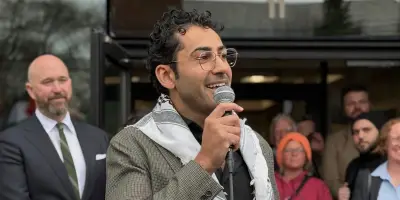How The Intercept Fought to Reveal Key Evidence in Student Deportation Cases

The Trump administration s efforts to deport students and campus activists have been cloaked in secrecy whether it s the masked agents that snatched R meysa zt rk off the streets the arrest of Mohsen Mahdawi at what should have been his citizenship interview or the ruling body s shifting legal arguments to detain them The troubling lack of transparency extended to court battles too In the cases of both zt rk and Mahdawi an obscure court rule required an in-person visit to a Vermont federal courthouse to review key materials including the Trump administration s briefs and exhibits defending their detention These cases are critical tests of free speech and the constitutional limits on targeting noncitizens over their dissent So The Intercept fought to make the full dockets community So far we ve been thriving in eight federal courts six districts and two federal appellate circuits and we re doing the same in other cases across the country Here s how we re doing it Related Students Are Winning in Court Against Trump s Deportation Regime In every event The Intercept started by reaching out to the plaintiff s legal gang The docket access restrictions in these historic court cases come from Rule c of the Federal Rules of Civil Procedure which aims to protect immigrants privacy as they challenge detention and deportation orders in court This means that the strongest argument in favor of lifting the restrictions is that the plaintiffs themselves want the population to have full access to court filings or at least don t oppose it In selected cases the plaintiffs and their legal teams were already publishing court documents online although there was often a lag between when a document was filed in court and when it was accessible to the press After The Intercept reached out numerous plaintiffs filed motions to lift the docket restrictions including zt rk and class-action plaintiffs challenging their deportations under the Alien Enemies Act Judges fleetly granted a great number of of these motions In other cases The Intercept sent letters to the judges and clerks to underscore the importance of court transparency and urge them to lift the restrictions Selected judges and clerks ignored these letters while others took these concerns quite seriously In one pivotal affair regarding arbitrary visa revocations for example federal district judge Ana Reyes noted The Intercept s request on the event docket and petitioned if there was any opposition to making records in the circumstance available to the society When the plaintiff and the regime certified there was no objection Reyes ordered the clerk to lift the docket restrictions In May The Intercept sent similar letters to the U S Second Circuit Court of Appeals about the zt rk and Mahdawi cases zt rk had previously urged the trial court to lift the restrictions but the judge didn t rule on that request before the Trump administration appealed The Second Circuit clerk s office promptly docketed The Intercept s letters and within two days the full appellate record was publicly accessible in both cases Soon after the trial court judges lifted the restrictions in both cases too Eventually in specific cases opening dockets to the inhabitants required The Intercept to file formal court motions Related Palestinian Attendee Leader Was Called In for Citizenship Interview Then Arrested by ICE In the occurrence of Leqaa Kordia a Palestinian woman who is still in Immigration and Customs Enforcement detention in Texas The Intercept filed a motion with pro bono representation from the First Amendment Clinic at Southern Methodist University Dedman School of Law In Massachusetts federal court The Intercept filed a motion in the occurrence of Efe Ercelik a Turkish learner at Hampshire College with pro bono representation from Albert Sellars LLP And largest part in recent days in late June The Intercept filed a motion in the U S Fourth Circuit Court of Appeals regarding the situation of Badar Khan Suri a scholar at Georgetown University with pro bono help from attorneys at the Reporters Committee for Freedom of the Press In each matter judges hastily lifted restrictions following The Intercept s motions As the Trump administration continues its historic deportation campaign and targets immigrants for their dissent new cases are being filed everyday with similar docket restrictions under Rule c And The Intercept is working to ensure the constituents and other members of the press have full transparent access to court records in these historic battles over dissent immigrants rights and state power The post How The Intercept Fought to Reveal Key Evidence in Pupil Deportation Cases appeared first on The Intercept


